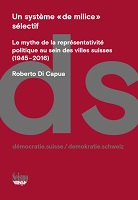Un système « de milice » sélectif
Le mythe de la représentativité politique au sein des villes suisses (1945-2016)
| dc.contributor.author | Di Capua, Roberto | |
| dc.date.accessioned | 2023-03-29T10:51:09Z | |
| dc.date.available | 2023-03-29T10:51:09Z | |
| dc.date.issued | 2022 | |
| dc.identifier.uri | https://library.oapen.org/handle/20.500.12657/62003 | |
| dc.description.abstract | This book is an adaptation of a doctoral thesis that studies the representativeness of the members of the local parliaments of four major Swiss cities (Zurich, Lausanne, Lucerne and Lugano) from 1945 to 2016. For this purpose, the author analyzes the recruitment system of the members of local and urban legislative organ in Switzerland and the historical evolution of their social profile. This research therefore constitutes an empirical test for the Swiss democratic ideal of the "militia system". The study takes a comparative and transdisciplinary approach, using both quantitative historical methods and spatial analyses. These methods interact with a theoretical corpus mainly drawn from elite sociology, political science and political theory. Thus, this book presents the first diachronic and comparative study on the profile of the members of local parliaments in Switzerland; an organ also largely ignored until now in the international literature. This research offers several contributions: first, it shows that the recruitment system of urban local elected representatives is socially selective – the chances of access to a local and urban legislative body vary according to social criteria (age, sex, level of education, profession, local roots, residential area); second, it notes that this social selectivity varies in time and space, mainly according to party systems, to socio-economic and spatial transformations in cities; thirdly, this research highlights a low presence of "militians" (understood as elected representatives socially resembling the population) and the dominance of two typical figures of urban local representatives, the "notable" (older figure from the center-right) and the "white collar" (more recent figure mainly from the center-left); fourth, in this research we try to open a theoretical discussion on the notion of "political militia" and its links with the question of representativeness, the author examines the various meanings of this term, its historical roots, its current political use, additionally, he questions its use in political science research; fifthly, this book also contributes to the political and socioeconomic history of the four cities studied. | en_US |
| dc.language | French | en_US |
| dc.relation.ispartofseries | ds démocratie.suisse / demokratie.schweiz | en_US |
| dc.subject.classification | thema EDItEUR::J Society and Social Sciences::JP Politics and government::JPH Political structure and processes::JPHV Political structures: democracy | en_US |
| dc.subject.other | political representativeness, local parliaments in Switzerland, social selectivity | en_US |
| dc.title | Un système « de milice » sélectif | en_US |
| dc.title.alternative | Le mythe de la représentativité politique au sein des villes suisses (1945-2016) | en_US |
| dc.type | book | |
| oapen.identifier.doi | 10.33058/seismo.20755 | en_US |
| oapen.relation.isPublishedBy | 2a4e97ae-726c-4086-a24b-d4536718a4a8 | en_US |
| oapen.relation.isFundedBy | 07f61e34-5b96-49f0-9860-c87dd8228f26 | en_US |
| oapen.relation.isbn | 9782883511101 | en_US |
| oapen.collection | Swiss National Science Foundation (SNF) | en_US |
| oapen.pages | 316 | en_US |

